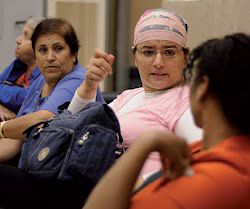
We have lived in Sderot for three years and it has taken all this time to realize the meaning
of life in the periphery for most of the residents. I'm not referring to the rockets. I am referring
to the relations between the different communities in Sderot who came on different waves
of aliyah, and the relations between Sderot, the kibbutzim of the Shaar Hanegev Regional
Council and the Sapir College founded by the Council.
This year I had the privilege of being part of a community project funded by Sapir College. It was a three-month, once-a-week course held at Sapir to train a cadre of Sderot volunteers to set up and run a citizens' advice center in Sderot, which we named the Social Rights Center.
The Center's aim is to make people aware of their rights and to help them realize those rights. Like other centers around the country, it helps residents deal with the authorities such as National Insurance (Bituach Leumi), the Electric Company or even cell phone companies. It became obvious with the opening of the Center that many residents were having problems with the contractors building the safe rooms funded by the government for Sderot residents, but more about that later.
The course was initiated and run by Dr. Merav Moshe-Grodovsky, a Sapir College senior lecturer in Public Policy and Administration, with a background in Social Work. She is originally from the United States – charming, dedicated and a wonderful role model for us all.
The Center for Social Rights has been running for a few months now, with the volunteers receiving clients twice a week, under the tutelage of a lawyer, Becky Cohen- Keshet (also born in the States) who is also responsible for the ongoing training of the volunteers. She is enthusiastic, caring, knowledgeable and professional.
The importance of the project, to my mind, and the reason I'm writing this article, is the make-up of the group of volunteers who took the course and are active in the Center. This group is heterogeneous - aged 20 to 82 - and from almost every Diaspora country as well as native Israelis.
Dr Moshe-Grodovsky and her staff managed to empower this disparate bunch and create a group spirit. As one volunteer said, “I am an academic now”. Others expressed their happiness at meeting the varied participants, and another said, "I was born here in Sderot but our group has given me an insight into the communities which make up my town”.
Monday mornings and Wednesday late afternoons, this diversity is displayed - an old-
timer who also volunteers at Bituach Leumi working alongside a young woman whose
husband is disabled, partly as the result of a rocket incident, who has become an expert on disability laws. Then there is a young man from Sderot's Kibbutz Ironi (urban) who is our website expert. There are more recent immigrants – Russian speakers from Bukhara and the Ukraine, a young man from Georgia married to a very new immigrant from Georgia, an Ethiopian man who is now attending a leadership course for his community, and a young Arab Moslem woman who lives with her family in Sderot. Their native languages are all needed to deal with clients at the Center.
Last week there was a lady from the Bedouin town of Rahat. Michal's and my English and Dina's Portuguese are not much needed!
But seriously. Sofia, an elderly volunteer from Bukhara, came to the Center with complaints
that she had collected from her neighbors about problems with their safe rooms - for example,
rain coming in after completion; problems with electricity; shoddy work and destruction of gardens and fences that are supposed to be restored after the work is completed.
If further proof of the impact of the project was needed, it was provided when Merav, who supervises the project, decided to deal with the problems of the safe rooms in one neighborhood in Sderot. Shelly and Moran, students from Sapir who attended our course, and who receive rent stipends on condition that they stay in a neighborhood in Sderot (like ESRA's Build-a-Neighborhood project), helped a community social work student who undertook to approach the authorities and the construction overseers who are responsible for signing the permits for the contractors to be paid. The student is writing a paper on the situation.
It is too early to assess the results of this intervention, which was carried out with the input of the volunteers of the Center from the neighborhood, but it is certainly an indication of the importance of the Center to those responsible from Sapir College. Let us hope that the Center will help the individual in need of guidance and help solve community problems too. And even more important, break down barriers of prejudice and resentment between the various groups mentioned in the opening paragraph.
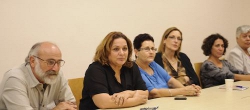
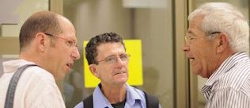
 ESRA Golf Competition 2012
ESRA Golf Competition 2012 Upside-Down Coffee – for another world. A Review
Upside-Down Coffee – for another world. A Review If I could tell you - a review
If I could tell you - a review-1450935317.jpg) Spending a Week in Tel Aviv
Spending a Week in Tel Aviv 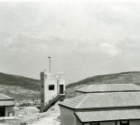 Ma'ale Hachamisha
Ma'ale Hachamisha-1450857993.jpg) Jazz in a Pearl Garden
Jazz in a Pearl Garden 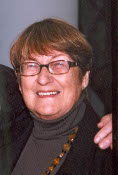 Adele Rubin
Adele Rubin